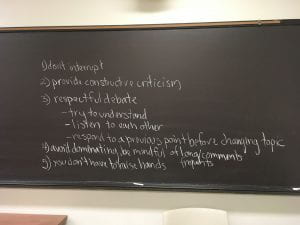Online and Hybrid Pedagogy and Guides from the Humanities Division
Defining Terms & Instructional Modes in the Online/Hybrid Learning Environment offers instructors with key definitions and compares advantages of types of hybrid and online instruction ( PDF – adapted from the F2020 Humanities Core Working Group)
Humanities Division Templates for Partial Face-to-Face Instruction under Social Distancing Requirements offers guidance for instructional design in a hybrid model that includes some opportunities for F2F interaction (PDF – FA2020 Instruction Working Group)
Humanities Division Recommendations and Templates for Partial Face-to-Face Instruction under Social Distancing Requirements offers guidance to language course instructors for instructional design in a hybrid model that includes some opportunities for F2F interaction (PDF – FA2020 Instruction Working Group)
Humanities Division Spring 2020 Online Teaching and Learning Survey Report and Teaching Takeaways offers information collected through the Division-wide surveys about faculty and graduate student experiences with online classes, as well as condensed teaching takeaways to inform online course design
VRC Notes on Teaching Remotely in Art History offers a comprehensive guidebook on everything from remote teaching policies at UChicago, Canvas course set-up recommendations to technology how-to’s and advice on accessing and using images in remote teaching (Google Doc with linked Table of Contents – VRC)
VRC Cookbook of Remote and Hybrid Instructional Strategies in Art History offers a set of pedagogical approaches and assignment ideas based on the experiences of Spring 2020 Art History instructors (Google Doc with linked Table of Contents – VRC)
Teaching Languages in Online and Hybrid Environments is an asynchronous Canvas course introducing best practices in online language pedagogy offered by Nick Swinehart at The Chicago Language Center, open for enrollment to any instructors in the Division. While many resources in the course are language-specific, there are also a wealth of resources that apply broadly to teaching humanities online here. (Canvas course – CLC)
Language Course Template is a sample Canvas course for teaching languages online from the Chicago Language Center to help get you started creating your Canvas site (sample Canvas site – CLC)
Online and Hybrid Pedagogy Resources Across Campus
Teaching Remotely is the University of Chicago’s central remote teaching website for course set-up, training, course management, pedagogical guidance, and FAQs on important university-wide remote teaching policies (Teaching Remotely website)
Pedagogical Guidance for Remote Teaching & Learning offers detailed pedagogical advice and recorded workshops on a range of online teaching topics (Chicago Center for Teaching website)
Social Sciences Teaching offers online teaching ideas, resources and guidance to prepare for Autumn 2020 from the Social Sciences Division (Social Sciences Teaching)
Remote Teaching Techniques by Preferred Teaching Method offers online “translations” of common face-to-face teaching methods (PDF – Chris Skrable, Chicago Studies & Experiential Learning)
Active Learning for the College Classroom Online offers research-based active learning strategies with instructions for the online classroom space (PDF – Chris Skrable, Chicago Studies & Experiential Learning)
Online and Hybrid Pedagogy Resources from Outside UChicago
Online Teaching Checklist offers concise “to-do’s” before, during week 1, throughout, and at the end of an online class, with tips on activities to generate a social online learning community (PDF developed by Bonnie Tucker – adapted from Colorado State University)
Rubric for Design of Online and Hybrid Courses offers guidelines for evaluating your online course (PDF – Quality Matters)
Carleton College’s Resilient Pedagogy offers a pedagogical framework for online/hybrid course design which foregrounds what they call “resilient pedagogy” for uncertain times, backward planning and universal design principles (Carleton College Learning and Teaching Center website)
Designing Effective Team Projects for Online Courses offers concrete course policies and practical advice for designing team-based learning effectively (Faculty Focus article)
Teaching Writing Online: How and Why is the first chapter of online writing scholar Scott Warnock’s text praising the benefits of online writing instruction with practical teaching tips (PDF)
Foundational Practices of Online Writing Instruction is an e-book of research-based practices in online writing instruction edited by Beth L. Hewett and Kevin Eric DePew, Elif Guler and Robbin Zeff Warner (PDF)



